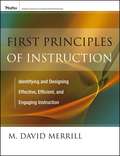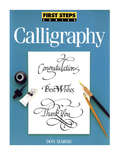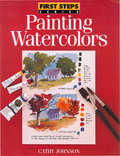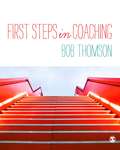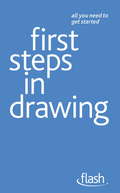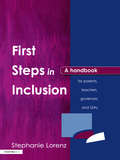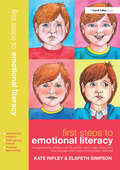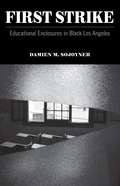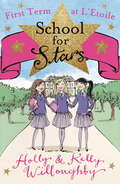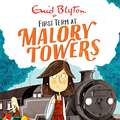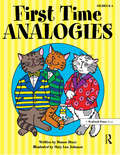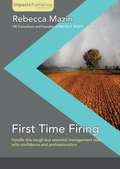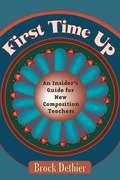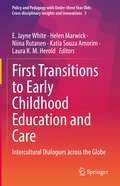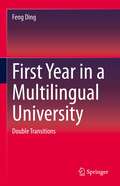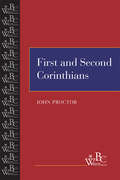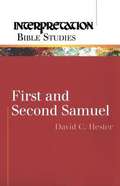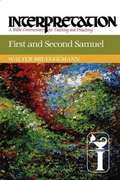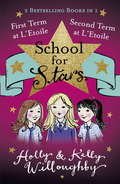- Table View
- List View
First Place (Sweet Valley Twins #8)
by Jamie Suzanne Francine PascalElizabeth absolutely adores horses, so much that she'll go as far as pretending to be friends with snotty Lila. She'll even do all of Thunder's grooming -- just for the chance to ride him every day.
First Principles of Instruction
by M. David MerrillThis handy resource describes and illustrates the concepts underlying the "First Principles of Instruction" and illustrates First Principles and their application in a wide variety of instructional products. The book introduces the e3 Course Critique Checklist that can be used to evaluate existing instructional product. It also provides directions for applying this checklist and illustrates its use for a variety of different kinds of courses. The Author has also developed a Pebble-in-the-Pond instructional design model with an accompanying e3 ID Checklist. This checklist enables instructional designers to design and develop instructional products that more adequately implement First Principles of Instruction.
First Steps Calligraphy (First Steps)
by Don MarshMake your first steps in calligraphy fun and rewarding! You'll be delighted at how easy this guide makes it to address invitations with a touch of class, send unforgettable greeting cards, and craft unique and meaningful gifts. With Don Marsh's simple and straightforward instruction, you'll be creating graceful handwritten expressions in no time! By learning a few key strokes (most of them found in the letters "a" and "n") you'll be able to form all the letters of the alphabet. In this book, you'll find everything you need to begin-including: Which tools and materials to buy to get off to a good, affordable start Easy-to-follow instructions for the most practical and popular lettering styles-simple italic minuscules, simple roman capitals, simple italic capitals and swash caps Easy (but effective) exercises that make learning fun How to create numerals and decorative flourishes Copy-and-use practice sheets Inspiring examples of the art of calligraphy More than a dozen projects-complete with stroke-by-stroke instruction-show you different ways to apply your new skills. You'll find practical and imaginative ideas for greeting cards, invitations, romantic verse and much more. And with Don's help, you can get started right away.
First Steps Painting Watercolors: How To Use Special Watercolor Techniques To Capture Nature's Unnoticed Wonders (First Steps)
by Cathy JohnsonMake your first steps in watercolor fun and rewarding! Watercolor's vivid colors and fresh, direct brush strokes make it the most exciting way to paint. "But," you think, "Learning to paint must be hard and frustrating." Not with Cathy Johnson as your teacher! Here, she makes learning to paint in watercolor fun-even easy! With Painting Watercolors, you'll learn to paint by picking up a brush and painting-not by reading about a bunch of confusing theories. Cathy tells you everything you need to begin-including: Which tools and materials you should buy to get off to a good, affordable start When, what, even where to paint Explanations of watercolor terms (such as "washes" and "puddles") Easy and useful painting tricks-such as glazing and drybrush. Exercises help you loosen up and learn the ins and outs of putting paint on paper. Easy-to-follow, step-by-step instructions show you how to paint water, believable skies, a variety of trees in different seasons and other popular elements. Plus, a dozen demonstrations show you how paintings come together, from initial sketch to final brushstrokes. With Cathy's help, you can start painting right away!
First Steps in Coaching
by Bob ThomsonFirst Steps in Coaching is an essential guide for anyone starting out in the coaching profession and for existing coaches seeking to develop their craft. It is a practical introduction to the theory, skills and art of coaching. The book's structure follows the reader's progression from novice to professional coach, making it an indispensable companion every step of the way. Part one - Learning to Walk - sets out the basics of coaching and considers the key skills of listening, questioning and playing back. Part two - Learning to Run - explores a variety of practical and ethical issues, and looks at coaching as a line manager and coaching a team. Part three - Learning to Dance - examines more advanced topics such as the coach's use of their self and the nature of the coach-client relationship. The book: - Uses clear, uncomplicated language throughout - Explains key ideas through brief illustrations from the author's practice and quotes from leading writers on coaching - Contains a wide selection of ideas, models and exercises to stimulate the reader's learning - Encourages students to try things out in conversation, and reflect upon and make sense of their experiences First Steps in Coaching is a must-have book for anyone interested in coaching skilfully, ethically and effectively.
First Steps in Drawing: Flash
by Robin CaponThe books in this bite-sized new series contain no complicated techniques or tricky materials, making them ideal for the busy, the time-pressured or the merely curious. First Steps in Drawing is a short, simple and to-the-point guide to learning the basic principles of drawing in a few short steps. Whether sketching people, places, buildings or just generally, in just 96 pages you will discover how to master the essential principles and create captivating and memorable work.
First Steps in Drawing: Flash
by Robin CaponThe books in this bite-sized new series contain no complicated techniques or tricky materials, making them ideal for the busy, the time-pressured or the merely curious. First Steps in Drawing is a short, simple and to-the-point guide to learning the basic principles of drawing in a few short steps. Whether sketching people, places, buildings or just generally, in just 96 pages you will discover how to master the essential principles and create captivating and memorable work.
First Steps in Inclusion: A Handbook for Parents, Teachers, Governors and LEAs
by Stephanie LorenzWith more parents of disabled children seeking a mainstream place for their child, educational professionals are increasingly being faced with the task of making these placements successful. For many this can be their first experience of including a child with significant difficulties. This book is aimed at all those, be they parents, teachers, learning support assistants, SENCOs, school managers, governors or LEA officers who are charged with ensuring that inclusion is effective both for individual children and for schools as a whole.Each chapter looks at the practicalities from a different perspective, focusing on the questions that need asking, the work that needs to be carried out before the child starts and practical steps that each person in the network can take to make sure that all those concerned are happy, are learning effectively and are fully included in the life of the school.
First Steps to Emotional Literacy: A programme for children in the FS & KS1 and for older children who have language and/or social communication difficulties
by Kate RipleyKate Ripley’s work in the topical area of Emotional Literacy has shown that children must first learn to discriminate and label their own emotions before they can focus on understanding other people's. This comprehensive programme is designed to assist early years practitioners help children to achieve these first important steps, the pack consists of: theoretical rationale – long and short version how the programme fits within the current legislative framework baseline assessment details pratical strategies to support the programme evaluation from pilot study bibliography and recommended materials. In addition to the book there is a CD-ROM containing a twenty minute video film showing behaviour to be addressed and intervention in action, a demonstration in powerpoint to show to colleagues and stories to use for baseline assessment.
First Strike: Educational Enclosures in Black Los Angeles
by Damien M. SojoynerCalifornia is a state of immense contradictions. Home to colossal wealth and long portrayed as a bastion of opportunity, it also has one of the largest prison populations in the United States and consistently ranks on the bottom of education indexes. Taking a unique, multifaceted insider&’s perspective, First Strike delves into the root causes of its ever-expansive prison system and disastrous educational policy. Recentering analysis of Black masculinity beyond public rhetoric, First Strike critiques the trope of the &“school-to-prison pipeline&” and instead explores the realm of public school as a form of &“enclosure&” that has influenced the schooling (and denial of schooling) and imprisonment of Black people in California. Through a fascinating ethnography of a public school in Los Angeles County, and a &“day in the life tour&” of the effect of prisons on the education of Black youth, Damien M. Sojoyner looks at the contestation over education in the Black community from Reconstruction to the civil rights and Black liberation movements of the past three decades. Policy makers, school districts, and local governments have long known that there is a relationship between high incarceration rates and school failure. First Strike is the first book that demonstrates why that connection exists and shows how school districts, cities and states have been complicit and can reverse a disturbing and needless trend. Rather than rely upon state-sponsored ideological or policy-driven models that do nothing more than to maintain structures of hierarchal domination, it allows us to resituate our framework of understanding and begin looking for solutions in spaces that are readily available and are immersed in radically democratic social visions of the future.
First Term & Second Form (Malory Towers #1)
by Enid BlytonFor new girl Darrell Rivers, there are friends to be made, pranks to be played and fun to be had at Malory Towers in Enid Blyton's best-loved boarding school series.First TermNew girl Darrell is two terms behind her classmates and feels out of place and alone. Soon, however, Darrell makes friends as well as enemies as they induct new students, win and lose sporting matches and play tricks on teachers.Second FormThere's a thief about! Purses and jewellery are missing in the North Tower. Meanwhile Darrell is caught in the middle when her friend Sally is made head girl instead of Alicia. Will they find the thief and will Alicia and Sally make up?There's drama at Malory Towers!Between 1946 and 1951, Enid Blyton wrote six novels set at Malory Towers. This digital download is abridged and dramatised with a full cast and makes wonderful listening for all Malory Towers fans. Each story is one hour. (P) Hodder Children's Books 2006
First Term at L'Etoile: Book 1
by Kelly Willoughby Holly WilloughbyThe enchanting debut novel from the immensely popular SCHOOL FOR STARS series, written by sisters Holly and Kelly Willoughby. This book is for every girl who has ever danced in front of the mirror, sung into a hairbrush, or dreamed of becoming a star.We are the Willoughby sisters and we have a story to share with you about one of the most important things in the world - friendship.On the first day of term at L'Etoile, School for Stars, twins Maria and Molly Fitzfoster meet Pippa Burrows who's won a song-writing scholarship to the school. The talented trio share the same dreams of super-stardom and become best friends. But will their friendship stand up against Lucifette Marciano's plans to wreck their chances and claim fame for herself?This book is GLEE for 9+ and is perfect for fans of BALLET SHOES and MALLORY TOWERS.
First Term at L'Etoile: Book 1 (School for Stars #1)
by Kelly Willoughby Holly WilloughbyThe enchanting debut novel from the immensely popular SCHOOL FOR STARS series, written by sisters Holly and Kelly Willoughby. This book is for every girl who has ever danced in front of the mirror, sung into a hairbrush, or dreamed of becoming a star.We are the Willoughby sisters and we have a story to share with you about one of the most important things in the world - friendship.On the first day of term at L'Etoile, School for Stars, twins Maria and Molly Fitzfoster meet Pippa Burrows who's won a song-writing scholarship to the school. The talented trio share the same dreams of super-stardom and become best friends. But will their friendship stand up against Lucifette Marciano's plans to wreck their chances and claim fame for herself?This book is GLEE for 9+ and is perfect for fans of BALLET SHOES and MALLORY TOWERS.
First Term: Book 1 (Malory Towers #1)
by Enid BlytonWelcome to Malory Towers, where there's more to life than lessons!In book 1 of Enid Blyton's best-loved boarding school series, Darrell Rivers is thrilled to start her first term at boarding school. She soon makes friends - and mischief! Another new girl, Gwendoline, is beginning to get on everyone's nerves. Will Darrell be able to keep her fiery temper under control? Now a 5* stage production and coming to TV on CBBC soon!Between 1946 and 1951, Enid Blyton wrote six novels set at Malory Towers. Book 1 was first published in 1946. This recording is based on the classic text.*(P) 2019 Hodder & Stoughton Limited Malory Towers ®, Enid Blyton ® and Enid Blyton's signature are registered trade marks of Hodder & Stoughton Limited. No trade mark or copyrighted material may be reproduced without the express written permission of the trade mark and copyright owner.
First Term: Book 1 (Malory Towers #1)
by Enid BlytonWelcome to Malory Towers, where there's more to life than lessons!In book 1 of Enid Blyton's best-loved boarding school series, Darrell Rivers is thrilled to start her first term at boarding school. She soon makes friends - and mischief! Another new girl, Gwendoline, is beginning to get on everyone's nerves. Will Darrell be able to keep her fiery temper under control? Now on CBBC!Between 1946 and 1951, Enid Blyton wrote six novels set at Malory Towers. Book 1 was first published in 1946. This edition features the classic text and is unillustrated.*Malory Towers ®, Enid Blyton ® and Enid Blyton's signature are registered trade marks of Hodder & Stoughton Limited. No trade mark or copyrighted material may be reproduced without the express written permission of the trade mark and copyright owner.
First Term: Book 1 (Malory Towers #1)
by Enid BlytonWelcome to Malory Towers, where there's more to life than lessons!In book 1 of Enid Blyton's best-loved boarding school series, Darrell Rivers is thrilled to start her first term at boarding school. She soon makes friends - and mischief! Another new girl, Gwendoline, is beginning to get on everyone's nerves. Will Darrell be able to keep her fiery temper under control? Now on CBBC!Between 1946 and 1951, Enid Blyton wrote six novels set at Malory Towers. Book 1 was first published in 1946. This edition features the classic text and is unillustrated.*Malory Towers ®, Enid Blyton ® and Enid Blyton's signature are registered trade marks of Hodder & Stoughton Limited. No trade mark or copyrighted material may be reproduced without the express written permission of the trade mark and copyright owner.
First Time Analogies: Grades K-2
by Dianne DrazeAn analogy is a comparison between two things. It points out the similarities between two things that might be different in all other respects. Analogies cause us to think analytically about forms, uses, structures, and relationships. First Time Analogies is the ideal launching pad to start nonreaders on the road to real thinking experiences with these pictorial and symbolic analogies that are both challenging and motivating. The book is divided into four sections that let you introduce analogies in a developmental way. The levels are: recognizing relationships; choosing one item to complete the analogy; given two items, choosing two other items that have the same relationships; and pairing up four items to complete two related pairs. Exercises are presented on worksheets that require circling the correct answer, as well as cutting out pictures and pasting them in the correct spaces. Attractive illustrations will draw students into the engaging exercises. Although they think they are just solving fun puzzles, they will be doing serious thinking and building a basis for future experiences in critical thinking. This is the first in a series of books that introduce analogies at varying difficulties and formats. The other books are Analogies for Beginners, Analogies for the 21st Century, Thinking Through Analogies, and Advancing Though Analogies. Grades K-2
First Time Firing
by Rebecca MazinFiring someone is never easy; it shouldn't be. The key to minimizing sweaty palms and the chance of stuttering through a statement is remembering that this is a business decision, and a business conversation. It requires preparation and planning for success. First Time Firing will provide you with clear and practical guidance to making termination decisions and acting on them. It will take you from making that first decision of the process, through preparing notes and recommendations, to delivering the news with confidence. Firing people is a difficult but necessary management task; it is essential that you maintain your professionalism and keep the needs of the business at the forefront of your mind. This hands-on guide is the perfect companion that will help you to do exactly that. Beginning with helpful advice on making a termination decision, HR expert Rebecca Mazin breaks down the process from the initial decision, through to planning and conducting the meeting, and then guides you through the necessary steps afterwards. With real life examples to illustrate best practices, First Time Firing takes a concise and logical approach giving you the confidence to handle a termination. About the Author: With more than 20 years of expertise, Rebecca Mazin formed RECRUIT RIGHT to create usable solutions for employers to meet increasingly complicated human resources challenges. Her clients benefit from clear guidance, tools, and techniques that quickly cut through fads, jargon, and complex regulatory issues. RECRUIT RIGHT consulting, training, and written communications produce measurable results in a wide range of businesses and not-for-profit organizations from small startups to industry giants. Rebecca uses her passion for demystifying human resources issues to write content accessible for business owners, managers, and HR pros. She is the author of The Employee Benefits Answer Book: An Indispensable Guide for Managers and Business Owners published by Pfeiffer in 2010 and the co-author of The HR Answer Book: An Indispensable Guide for Managers and Human Resources Professionals published by AMACOM in 2004 with a revised edition issued in 2011. Her advice and commentary appears in business publications, industry and trade journals, and Rebecca is a featured expert on the award winning www.AllBusiness.com website. Follow Rebecca on Twitter at @thehranswer. Prior to founding RECRUIT RIGHT, she held key management positions at major organizations. Her experience with Millennium Hotels and Hyatt Hotels Corporation built on her work at Owens Corning and the U.S. Federal Government at the National Labor Relations Board. Rebecca is a graduate of Cornell University with a degree in Labor Relations. She is a certified facilitator of Achieve Global training programs. Rebecca is active in the community, where she uses her skills and talents to enhance organizational effectiveness and outcomes. Rebecca was board co-chair for MTS, a non-profit that hired, trained and placed individuals with HIV Aids and has held board positions with The Junior League of Westchester on the Sound. She currently serves on the board of Furniture Sharehouse, Westchester's Furniture Bank.
First Time Up: An Insider'S Guide For New Composition Teachers
by Brock Dethier"First time up?"—an insider’s friendly question from 1960s counter-culture—perfectly captures the spirit of this book. A short, supportive, practical guide for the first-time college composition instructor, the book is upbeat, wise but friendly, casual but knowledgeable (like the voice that may have introduced you to certain other firsts). With an experiential focus rather than a theoretical one, First Time Up will be a strong addition to the newcomer’s professional library, and a great candidate for the TA practicum reading list. Dethier, author of The Composition Instructor’s Survival Guide and From Dylan to Donne, directly addresses the common headaches, nightmares, and epiphanies of composition teaching—especially the ones that face the new teacher. And since legions of new college composition teachers are either graduate instructors (TAs) or adjuncts without a formal background in composition studies, he assumes these folks as his primary audience. Dethier’s voice is casual, but it conveys concern, humor, experience, and reassurance to the first-timer. He addresses all major areas that graduate instructors or new adjuncts in a writing program are sure to face, from career anxiety to thoughts on grading and keeping good classroom records. Dethier’s own eclecticism is well-represented here, but he reviews with considerable deftness the value of contemporary scholarship to first-time writing instructors—many of whom will be impatient with high theory. Throughout the work, he affirms a humane, confident approach to teaching, along with a true affection for college students and for teachers just learning to deal with them.
First Transitions to Early Childhood Education and Care: Intercultural Dialogues across the Globe (Policy and Pedagogy with Under-three Year Olds: Cross-disciplinary Insights and Innovations #5)
by E. Jayne White Niina Rutanen Helen Marwick Katia Souza Amorim Laura K. M. HeroldThis book brings together the work of researchers from around the globe around the topic of children’s first transitions to early care and education. It discusses political and sociocultural contexts, theories, and ideologies around the theme. The book offers perspectives and findings on adult expectations around a child’s first transition, infant emotional experiences, the role of space, the part that key objects play in infant transitions, and the role of time. It also discusses age of first entry, routines and rhythms of the institutions, and the future expectations of those involved. The book takes a culturally responsive approach, revealing at times striking commonalities across countries, and at other points distinct differences in the people, environments, orienting pedagogies, and policies that inform an infant’s transition into care.
First Year in a Multilingual University: Double Transitions
by Feng DingAlthough both school–university transitions and cross-border transitions have been widely explored, comparatively little research has been conducted on those students who undergo both transitions at the same time. This book reports on a longitudinal qualitative study investigating the major issues faced by nine Mainland Chinese students during their first year at a Hong Kong university from the perspective of learner autonomy. It argues that the school–university transition is especially challenging for students going through a cross-border transition at the same time, which usually involves a linguistic and cultural adjustment, and challenges their autonomy in three domains: managing their personal lives; academic learning; and English learning.Adopting the perspective of autonomy enables us to better understand student transitions so that more appropriate support can be provided for this group. Given its scope, the book offers a valuable asset for educators at both the secondary and post-secondary levels, and underscores the need to help students bridge the gap between school and university, and thus advance along the continuum of autonomy more smoothly. It also has practical implications for students who are studying or intend to study abroad.
First and Second Corinthians
by John ProctorBooks in the Westminster Bible Companion series assist leaders and students in their study of the Bible as a guide to Christian faith and practice. Each volume presents the text under discussion, explains the biblical book in its original historical context, and explores the text's significance for faithful living today. These books are ideal resources for preparing text-based sermons and a worthy addition to seminary courses and advanced Bible study groups. In this volume, John Proctor provides an accessible study on First and Second Corinthians. Paul's first letter to the Corinthians addresses the basic components of human life, such as leadership, marriage, hospitality, and bereavement. The second letter mostly revolves around the pains and joys of a pastoral relationship. Proctor's volume provides insightful commentary that examines how the letters spoke to the people of Corinth and how they are received today.
First and Second Samuel
by David C. HesterDuring the reigns of Saul and David as recorded in First and Second Samuel, the people of Israel experience fear, disappointment, heartache, and betrayal. The compelling theme that weaves its way through these two books and into our lives is the need to balance both the gift of life from God and the promise of God's steadfast love with the ever-present human temptation to take control and usurp God's authority . Interpretation Bible Studies (IBS) offers solid biblical content in a creative study format. Forged in the tradition of the celebrated Interpretation> commentary series, IBS makes the same depth of biblical insight available in a dynamic, flexible, and user-friendly resource. Designed for adults and older youth, Interpretation Bible Studies can be used in small groups, in church school classes, in large group presentations, or in personal study.
First and Second Samuel
by Walter BrueggemannWith critical scholarship and theological sensitivity, Walter Brueggemann traces the people of God through the books of Samuel as they shift from marginalized tribalism to oppressive monarchy. He carefully opens the literature of the books, sketching a narrative filled with historical realism but also bursting with an awareness that more than human action is being presented. Interpretation: A Bible Commentary for Teaching and Preaching is a distinctive resource for those who interpret the Bible in the church. Planned and written specifically for teaching and preaching needs, this critically acclaimed biblical commentary is a major contribution to scholarship and ministry.
First and Second Term at L'Etoile: Books 1 and 2
by Kelly Willoughby Holly WilloughbyA 2-in-1 edition of the first two sparkling School for Stars stories by TV presenter Holly Willoughby and her sister Kelly.On the first day of term at L'Etoile, School for Stars, twins Maria and Molly Fitzfoster meet Pippa Burrows who's won a song-writing scholarship to the school. The talented trio share the same dreams of super-stardom and become best friends. But will their friendship stand up against Lucifette Marciano's plans to wreck their chances and claim fame for herself?And in their second term, Molly, Maria and Pippa are reunited for plenty more fun and surprises. A midnight mystery, a precious lost rose, centenary celebrations, a playful puppy with a twinkle in its eyes, and a royal visit are just some of the things that make them friends for ever.

